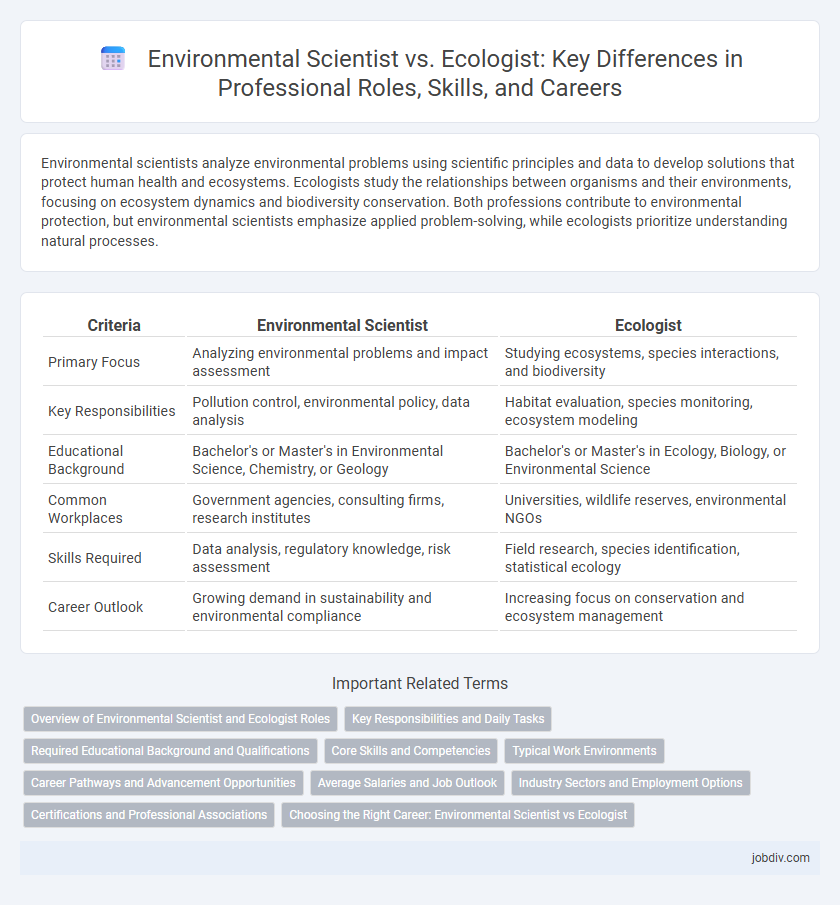Environmental scientists analyze environmental problems using scientific principles and data to develop solutions that protect human health and ecosystems. Ecologists study the relationships between organisms and their environments, focusing on ecosystem dynamics and biodiversity conservation. Both professions contribute to environmental protection, but environmental scientists emphasize applied problem-solving, while ecologists prioritize understanding natural processes.
Table of Comparison
| Criteria | Environmental Scientist | Ecologist |
|---|---|---|
| Primary Focus | Analyzing environmental problems and impact assessment | Studying ecosystems, species interactions, and biodiversity |
| Key Responsibilities | Pollution control, environmental policy, data analysis | Habitat evaluation, species monitoring, ecosystem modeling |
| Educational Background | Bachelor's or Master's in Environmental Science, Chemistry, or Geology | Bachelor's or Master's in Ecology, Biology, or Environmental Science |
| Common Workplaces | Government agencies, consulting firms, research institutes | Universities, wildlife reserves, environmental NGOs |
| Skills Required | Data analysis, regulatory knowledge, risk assessment | Field research, species identification, statistical ecology |
| Career Outlook | Growing demand in sustainability and environmental compliance | Increasing focus on conservation and ecosystem management |
Overview of Environmental Scientist and Ecologist Roles
Environmental scientists analyze the impact of human activities on natural systems, conducting research and developing solutions to address environmental challenges such as pollution, climate change, and resource management. Ecologists study the relationships between organisms and their ecosystems, focusing on biodiversity, species interactions, and habitat conservation to understand ecological balance and sustainability. Both roles require strong scientific expertise, but environmental scientists often work on broader policy and regulatory issues, while ecologists concentrate on biological processes within ecosystems.
Key Responsibilities and Daily Tasks
Environmental scientists analyze data to assess pollution levels, develop sustainability plans, and conduct environmental impact assessments for regulatory compliance. Ecologists study ecosystems and biodiversity, monitor species populations, and evaluate habitat health to support conservation efforts. Both roles involve fieldwork and data collection, but environmental scientists emphasize human impact and policy, while ecologists focus on ecosystem dynamics and natural habitats.
Required Educational Background and Qualifications
Environmental scientists typically require a bachelor's degree in environmental science, biology, chemistry, or a related field, with many roles favoring a master's degree for advanced research or management positions. Ecologists often pursue degrees specifically in ecology, biology, or environmental science, emphasizing courses in ecosystems, biodiversity, and population dynamics, and frequently obtain graduate degrees to conduct specialized research. Certification and practical experience through internships or fieldwork are essential for both professions to develop expertise in environmental assessment and ecological analysis.
Core Skills and Competencies
Environmental scientists possess core skills in data analysis, field research, and environmental regulations, enabling them to assess pollution levels and develop sustainable solutions. Ecologists specialize in ecosystem dynamics, species interactions, and biodiversity conservation, applying competencies in habitat assessment and ecological modeling. Both roles require strong analytical abilities and proficiency in environmental monitoring technologies to support informed decision-making.
Typical Work Environments
Environmental scientists often work in diverse settings such as government agencies, consulting firms, and research institutions, conducting fieldwork at contaminated sites or analyzing environmental data in laboratories. Ecologists typically operate in natural environments like forests, wetlands, and wildlife reserves, studying ecosystems and species interactions through field observations and experiments. Both professions require adaptability to outdoor conditions, but environmental scientists may spend more time in urban or industrial locations, while ecologists focus on natural habitats.
Career Pathways and Advancement Opportunities
Environmental scientists often engage in broader roles involving pollution control, resource management, and regulatory compliance, offering diverse career pathways in government agencies, consulting firms, and research institutions. Ecologists specialize in studying ecosystems and biodiversity, with advancement opportunities typically found in academia, conservation organizations, and wildlife management. Both career paths benefit from advanced degrees and field experience, but environmental scientists may experience faster lateral movement across industries due to their interdisciplinary skillsets.
Average Salaries and Job Outlook
Environmental scientists earn an average salary ranging from $55,000 to $95,000 annually, with a strong job outlook driven by growing environmental regulations and sustainable development initiatives. Ecologists typically have salaries between $50,000 and $85,000, supported by steady demand in habitat conservation, research, and biodiversity management fields. Both professions are projected to experience employment growth of approximately 5% to 8% over the next decade, reflecting expanding environmental awareness and resource management needs.
Industry Sectors and Employment Options
Environmental scientists typically find employment in diverse industry sectors such as government agencies, environmental consulting firms, and private corporations focused on pollution control, natural resource management, and regulatory compliance. Ecologists are often employed by academic institutions, wildlife conservation organizations, and environmental non-profits, concentrating on ecosystem research, biodiversity preservation, and habitat restoration. Both professions offer opportunities in environmental impact assessment and sustainable development, though environmental scientists tend to engage more with policy and industrial applications while ecologists emphasize field research and ecological theory.
Certifications and Professional Associations
Environmental scientists often pursue certifications such as the Registered Environmental Scientist (RES) credential offered by the National Registry of Environmental Professionals (NREP), enhancing their expertise in environmental analysis and compliance. Ecologists commonly obtain credentials like the Certified Ecologist (CE) designation from the Ecological Society of America (ESA), which validates their proficiency in ecological research and conservation. Membership in professional associations including the Society of Environmental Toxicology and Chemistry (SETAC) for environmental scientists and the Ecological Society of America (ESA) for ecologists provides access to ongoing education, networking opportunities, and industry standards.
Choosing the Right Career: Environmental Scientist vs Ecologist
Environmental scientists focus on analyzing environmental data and developing solutions to address pollution, climate change, and natural resource management, often working in laboratories or regulatory agencies. Ecologists study ecosystems, biodiversity, and species interactions primarily through field research and data modeling, contributing to conservation efforts and habitat restoration. Choosing between these careers depends on whether you prefer applied science with policy impact or in-depth ecological research and ecosystem management.
Environmental Scientist vs Ecologist Infographic

 jobdiv.com
jobdiv.com